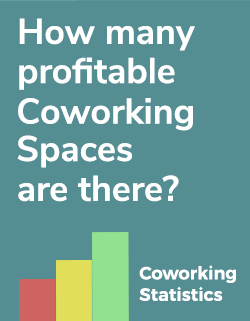Large coworking spaces plan expansions, small ones stay as they are
Every second existing coworking space plans to expand its own capacity in 2023. Based on the different levels of expectation, they are planning new workspaces more often in urban centers (65%) than in rural areas (38%).
In general, large coworking spaces are expected to grow in size, while small ones plan to remain as they are. The questions are not about wishes, but about plans. It is possible that small coworking spaces would also like to expand, but lack the demand at the location or the funds to do so.
Based on current intentions, 44% of coworking spaces will offer more private offices. Similarly, more than one in three have more meeting rooms and more flexible desks in open workspaces in their 2023 business plans.
New locations are also in the pipeline for every third coworking space. Although the question has changed a little from previous surveys, this is roughly in line with pre-pandemic levels.
Prices will rise, especially in large cities
When it comes to average prices, the results are very different from before the pandemic. Two out of three coworking spaces will raise them this year or have already done so.
Prices are not expected to jump dramatically. However, the larger the city, the more likely it is that they will be raised. In megacities, 80% of coworking spaces intend to charge more for their services; in small towns and rural areas, less than half.
Again, we changed the question a bit for a simplified questionnaire. Nevertheless, the result is likely caused or motivated by inflation, and in particular echoes the problem of overpriced real estate in large cities.
Please note: While trends for specific groups of coworking spaces can be derived from the survey, the statements do not evaluate individual coworking spaces simply because they belong to a particular group derived from a single characteristic such as their current region or size.
The survey will run until the end of May. Some of the questions on which this article is based will be replaced by new ones. If you are a member or operator of a coworking space and have not yet participated, we invite you to take the survey at CoworkingSurvey.com. The more people who take part, the more detailed the results we can share!
As with this article, we will continue to make the key findings free of charge. You can download the free chart report that underpins this article, get more detailed results, and read more about the report in our first article. We also have added a new article on the profitability of coworking spaces.
▿ ▿ ▿ ▿ ▿ ▿ ▿ ▿ ▿ ▿ ▿ ▿ ▿ ▿ ▿ ▿ ▿ ▿ ▿ ▿ ▿ ▿ ▿ ▿ ▿ ▿ ▿ ▿ ▿ ▿ ▿ ▿
The 2023 Global Coworking Survey is supported by the following organizations:
★ Our Main Supporters: ★
Yardi Kube helps operators automate their space, drive revenue, reduce costs and efficiently scale their business.
Nexudus is a leading white-label platform to help coworking space operators with their day-to-day tasks.
☆ Our Official Supporters: ☆
Coworking Europe, European Coworking Assembly, German Coworking Federation, Coworking Switzerland, CoWorkLand, Bisdesk, Cobot, Cat Johnson, Rubberdesk, Coworking Canada, andCards, One Coworking, deskpass, Republic of Work, Coworking Library, Women Who Cowork, Salto Systems, Aurora Coworking Network, Coworking Association Ukraine, DeKamer, ThisWeekinCoworking.com, The Melting Pot, London Coworking Association, Happy Working Lab, ezeep, Proova, ULSL, Coworking Kemnath, Coworking IDEA Project & you, if you share the Global Coworking Survey with your network.
278 individuals representing flexible workspaces, primarily coworking spaces, were included in the analysis of this report. Their responses have been received between February 9 and March 30, 2023. During this time, 64% came from Europe, 21% from North America and 15% from other continents.






